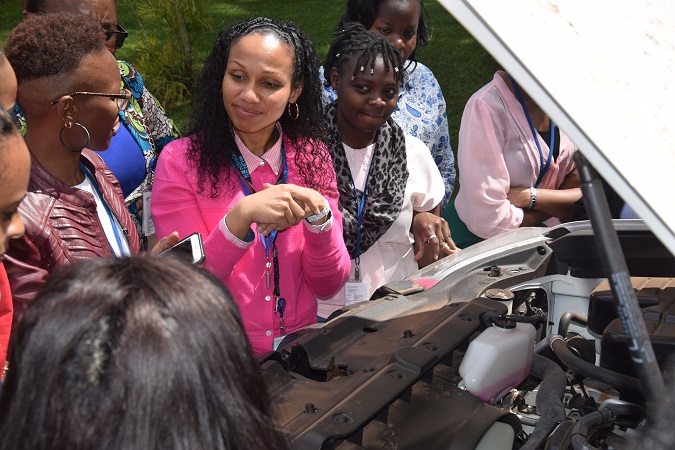Take Five: 'Unless women feel safe in their homes, places of work and other environs, they will not reach their full potential'
Berkis Patricia Pérez has been working in safety and security for almost two decades. She started her career in the Dominican Republic, where she reached the rank of Air Force Lieutenant Colonel. She joined UN Women in September 2017, as Regional Security Specialist for Africa, where she supports two Regional Offices and 1 Multi Country Office representing 42 UN Women offices. Since her time in Law School, Patricia had always wanted to join the UN to be the voice of the voiceless. After working for the United Nations Department of Safety and Security (UNDSS) in multiple locations, Berkis came to the realization that women had specific security needs. It was a dream come true for Berkis when, through hard work and perseverance, UN Women selected her for this important role.Date:

What drives you every day as you carry out your role as the regional security focal point person in the region?
My passion stems from being able to empower other women. When teaching them how to raise awareness of the security risks that they are exposed to and how to mitigate those risks, it is certain that they are able to work with confidence. Seeing this materialize into reality, brings me joy and I really love what I do!
What are the unique challenges and opportunities for women's safety both in private and public spaces?
We still have challenges including ensuring inclusive security and mainstreaming the gender perspective into all policies and programmes in the United Nations System. At the same time, opportunities are arising. UN Secretary General, António Guterres, has taken a strong stand to ensure the UN reaches gender parity.
Quoting his words: "Gender parity at the United Nations is an urgent need and a personal priority. It's a moral duty and an operational necessity. The meaningful inclusion of women in decision-making increases effectiveness and productivity, brings new perspectives and solutions to the table, unlocks greater resources, and strengthens efforts across all the three pillars of our work." Women will surely be the main beneficiaries of this initiative.
UN Women is advocating for a mandatory security training for women staff- an initiative that you have been championing for. Why was this necessary?
UN Women is committed to ensuring safe spaces for women. UN Women is involved in various working groups and safety committees including the Inter Agency Security Management Network (IASMN) working Group for Gender Inclusion in UN Security Management. Women’s Security Awareness Training was designed in collaboration with other UN Agencies, Funds and Programmes as well as the United Nations Department of Safety and Security whose focus is to standardize quality content and coordinate system wide delivery of the training. Women’s Security Awareness Training is one part of a larger programme and advocacy to ensure the mainstreaming and inclusion of gender considerations in United Nations Security Management. The training is especially necessary for our field based colleagues involves themes including but not limited to Safe travel/commuting, Cultural Awareness, Hostage Survival, Sexual Harassment, Violence against Women, Stress Management and Self Defense Techniques/Tips.
What is your advice to girls and women who are looking into joining fields that have previously been dominated by men?
I encourage them to take advantage of all training platforms which give them with knowledge and skills that prepare them to take part in male dominated fields. Nowadays, there are more opportunities that they can make use of their talents and ideas. Furthermore, participating in those fields allows them to bring in gender sensitive approaches which contribute to shifting society in the right direction.
Considering Eastern and Southern Africa region has a number of volatile situations and potential threats for example in Somalia and South Sudan. How critical is your role in ensuring that UN Women continues working for the benefit of its beneficiaries, despite such setbacks?
This region is prone to multiple threats such as crime, terrorism, civil unrest, armed conflict and hazards. As the UN Women Regional Security Specialist for Africa, I have a critical role in advising and assisting UN Women personnel on their safety and security responsibilities to protect from and minimize risks while in the field. I do this by providing leadership and direction in security policies, procedures and plans. I also support personnel facing security incidents and help raise their awareness on security and preparedness among other security matters.